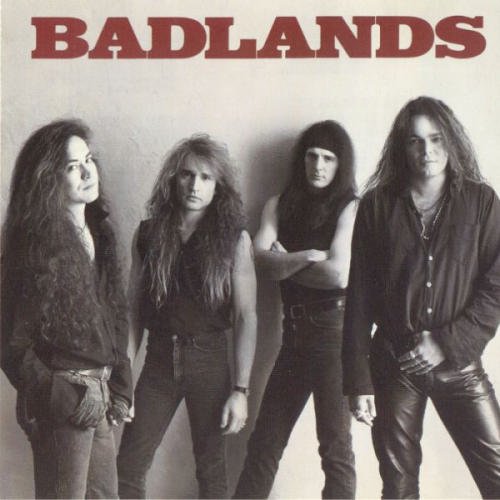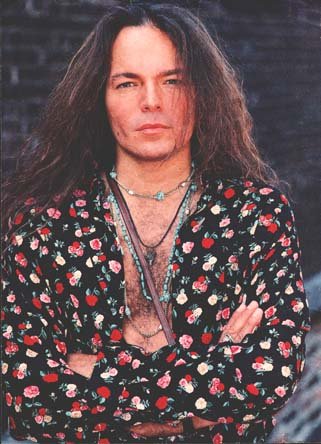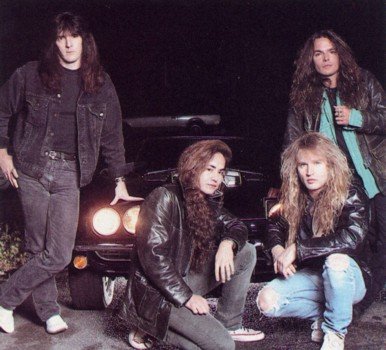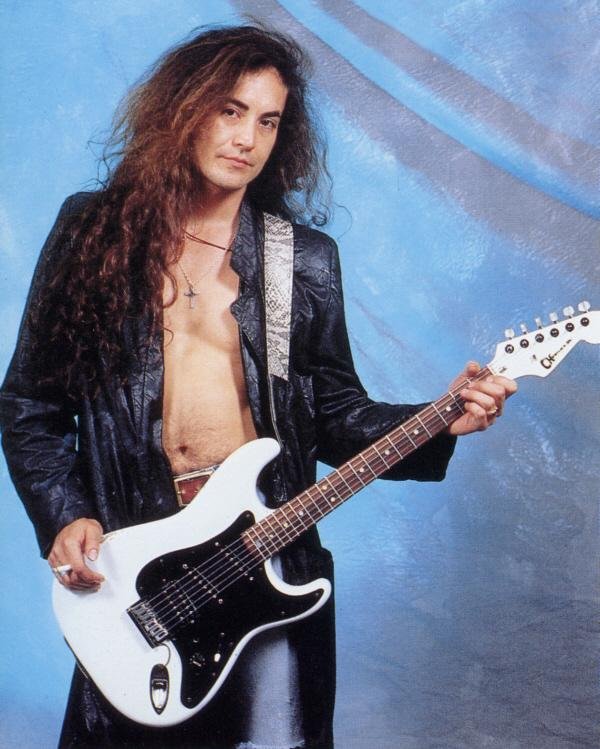BADLANDS - S/T: Never Mind The Hair-Farmers, Here's The Roots-Rockers
The late 1980's were a dark time for purveyors of traditional hard rock. Hair metal was the order of the day, with hair-farmers like Poison and Warrant pushing the pop quotient higher and moving further and further away from the earthy, rugged style perfected by the 1970's pioneers of hard rock. It was hard to get a contract if you didn't have a "lipstick & hairspray" image and plenty of power ballads to earn your keep on the radio. However, the occasional act managed to bring some sense of roots into this pop-driven era of hard rock. Guns & Roses is the best-known and most successful of these trend-bucking acts but there were others who toiled in obscurity and deserve rediscovery. One of the best was Badlands, a supergroup of sorts formed by Jake E. Lee after he left Ozzy Osbourne's backing band. They only lasted two albums but managed to pack each with songs that fused modern sensibilities with classic hard-rock craftsmanship.Their debut album was unleashed in 1989 and remains a hard-riffing delight. Lee penned all the songs and they're cut from the same cloth as pre-Houses Of The Holy Led Zeppelin, Free, Bad Company and Humble Pie. Each melody is built on sturdy guitar riffs but they are fleshed out with sometimes bluesy, sometimes funky shadings that lend it an earthiness that
However, the occasional act managed to bring some sense of roots into this pop-driven era of hard rock. Guns & Roses is the best-known and most successful of these trend-bucking acts but there were others who toiled in obscurity and deserve rediscovery. One of the best was Badlands, a supergroup of sorts formed by Jake E. Lee after he left Ozzy Osbourne's backing band. They only lasted two albums but managed to pack each with songs that fused modern sensibilities with classic hard-rock craftsmanship.Their debut album was unleashed in 1989 and remains a hard-riffing delight. Lee penned all the songs and they're cut from the same cloth as pre-Houses Of The Holy Led Zeppelin, Free, Bad Company and Humble Pie. Each melody is built on sturdy guitar riffs but they are fleshed out with sometimes bluesy, sometimes funky shadings that lend it an earthiness that  most hard rock acts of that era couldn't evoke. His songwriting also shows considerable range, covering everything from adrenalized speed-riffers ("Hard Driver") to multi-part epics featuring complex shifts of tone ("Streets Cry Freedom") with equal degrees of aplomb.The soulful/bluesy edge of Badlands is further enhanced by vocalist Ray Gillen, who had the kind of high-power pipes necessary to sell the intensity of Lee's material. His sound could easily be described as a grittier, more macho variation on the blues-wail Robert Plant used on Led Zeppelin's early albums, shot through with a bit of blue-eyed soul that conjures up images of Steve Marriott or Terry Reid. He was also able to temper his power with a sense of melody-conscious delicacy necessary for the gentler moments in songs like "Winter's Call" or "Seasons."
most hard rock acts of that era couldn't evoke. His songwriting also shows considerable range, covering everything from adrenalized speed-riffers ("Hard Driver") to multi-part epics featuring complex shifts of tone ("Streets Cry Freedom") with equal degrees of aplomb.The soulful/bluesy edge of Badlands is further enhanced by vocalist Ray Gillen, who had the kind of high-power pipes necessary to sell the intensity of Lee's material. His sound could easily be described as a grittier, more macho variation on the blues-wail Robert Plant used on Led Zeppelin's early albums, shot through with a bit of blue-eyed soul that conjures up images of Steve Marriott or Terry Reid. He was also able to temper his power with a sense of melody-conscious delicacy necessary for the gentler moments in songs like "Winter's Call" or "Seasons." The rhythm section, held down by bassist Greg Chaisson and a pre-Kiss Eric Singer, is also worthy of praise. Songs like "Live Wire" and "Rumblin' Train" wouldn't track nearly as well without the sense of swing that the rhythm section brings to them.However, this is ultimately Lee's show and he drives Badlands home with a sustained level of fret-shredding abandon. His playing is showy yet expressive, upholding the traditionalist vibe of the songs while bringing in a more modern sense of complexity and speed to the solos. He sounds like he's having the time of his life as he throws out every trick in the 1970's hard-rocker book, even working in a brief acoustic piece ("Jade's Song") that allows him to show off his non-amplified guitar skills. Air-guitarists will have a field day with the buffet of six-string fireworks he lays
The rhythm section, held down by bassist Greg Chaisson and a pre-Kiss Eric Singer, is also worthy of praise. Songs like "Live Wire" and "Rumblin' Train" wouldn't track nearly as well without the sense of swing that the rhythm section brings to them.However, this is ultimately Lee's show and he drives Badlands home with a sustained level of fret-shredding abandon. His playing is showy yet expressive, upholding the traditionalist vibe of the songs while bringing in a more modern sense of complexity and speed to the solos. He sounds like he's having the time of his life as he throws out every trick in the 1970's hard-rocker book, even working in a brief acoustic piece ("Jade's Song") that allows him to show off his non-amplified guitar skills. Air-guitarists will have a field day with the buffet of six-string fireworks he lays  out on this album.In short, this album has a timeless blend of mood and power that makes it hard-rock classic from an era of the genre that wasn't known for its substance. Fans of the old stuff can pick it up with confidence: Badlands is the work of a group who walked it like they talked it.CD Notes: this was originally issued on disc by Atlantic and that OOP version goes for collector's prices now. Interested listeners are directed to the recent Rock Candy Records CD reissue, which boasts a powerful remastered sound and liner notes that use an interview with bassist Chaisson to lay out the complex personality and business issues that insured the band would have a short life.
out on this album.In short, this album has a timeless blend of mood and power that makes it hard-rock classic from an era of the genre that wasn't known for its substance. Fans of the old stuff can pick it up with confidence: Badlands is the work of a group who walked it like they talked it.CD Notes: this was originally issued on disc by Atlantic and that OOP version goes for collector's prices now. Interested listeners are directed to the recent Rock Candy Records CD reissue, which boasts a powerful remastered sound and liner notes that use an interview with bassist Chaisson to lay out the complex personality and business issues that insured the band would have a short life.


